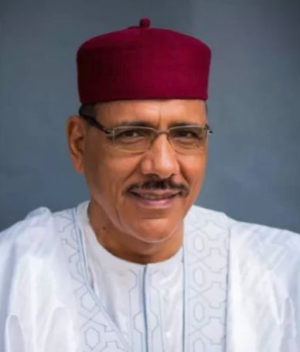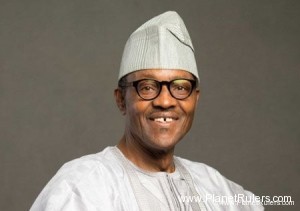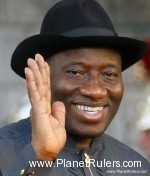Mohamed Bazoum, President of Nigeria (since Apr 2, 2021)

Before becoming a President, he served as the President of the Nigerien Party for Democracy and Socialism (PNDS-Tarayya). He also served in as a Minister of Foreign Affairs from 1995 to 1996 and again from 2011 to 2015. He was Minister of State at the Presidency from 2015 to 2016, and was Minister of State for the Interior between 2016 and the summer of 2020, when he resigned to focus on running for the 2020–21 presidential election. Bazoum won the second round of the presidential election with 55.67% of the vote against former president Mahamane Ousmane. Bazoum is a Sunni Muslim and the first Diffa Arab president of Niger.
As a high-ranking member of the Nigerien government, Bazoum was named the successor to Issoufou as the presidential candidate for the PNDS in the 2020–21 Nigerien general election. Bazoum’s presidential campaign focused on ideas such as resolving demographic problems within Niger by limiting family size and increasing literacy and gender equality through more education for girls. Bazoum has also promised to target the ISIS insurgency in Niger, assisting the neighboring country of Mali in the process, reinforce Nigerien defence and security, and tackle corruption in the country. Bazoum did not win the first round of the election, held on 27 December 2020, obtaining only 39.30% of the vote. However, he won the runoff election in February 2021 with 55.67% of the vote and was sworn in as President on 2 April, his victory being confirmed on 21 March.
Source: https://en.wikipedia.org/wiki/Mohamed_Bazoum
Muhammadu Buhari, President of Nigeria (since May 29, 2015; re-elected on Feb 23, 2019)

He ran unsuccessfully for the office of President in the 2003, 2007 and 2011 elections. In December 2014, he emerged as the presidential candidate of the All Progressives Congress for the March 2015 elections. Buhari won the 2015 general election, defeating the incumbent President Goodluck Jonathan and marking the first time in Nigeria’s history that an incumbent President was defeated in an election by the opposition.
Buhari has stated that he takes responsibility for whatever happened under his watch during his military rule, saying that he cannot change the past. He has described himself as a “converted democrat”.
In 1971, Buhari married his first wife, Safinatu (née Yusuf) Buhari (First lady of Nigeria December 1983-August 1985). They had five children together, four girls and one boy. Their first daughter, Zulaihat (Zulai) was named after Buhari’s mother. Their other children are Fatima, Musa (deceased), Hadiza, and Safinatu.
In 1988, Buhari and his first wife Safinatu were divorced. In December 1989, Buhari married his second and current wife Aisha (née Halilu) Buhari. They also have five children together, a boy and four girls. They are Aisha, Halima, Yusuf, Zarah and Amina.
On 14 January 2006, Safinatu Buhari, the former first lady, died from complications of diabetes. She was buried at Unguwar Rimi cemetery in accordance with Islamic rites.
In November 2012, Buhari’s first daughter, Zulaihat (née Buhari) Junaid died from sickle cell anaemia, two days after having a baby at a hospital in Kaduna.
Source: https://en.wikipedia.org/wiki/Muhammadu_Buhari
Goodluck Jonathan, Former President of Nigeria (since May 6, 2010. reelected on Apr 16, 2011)
Goodluck Ebele Jonathan (born 20 November 1957) is a Nigerian politician and currently the President of Nigeria. He was Governor of Bayelsa State from 9 December 2005 to 28 May 2007, and was sworn in as Vice President of the Federal Republic of Nigeria on 29 May 2007. Jonathan is a member of the ruling People’s Democratic Party (PDP). On 13 January 2010, a federal court handed him the power to carry out state affairs while President Umaru Yar’Adua received medical treatment in a Saudi Arabian hospital. A motion from the Nigerian Senate on 9 February 2010 confirmed these powers to act as President. On 24 February 2010 Yar’Adua returned to Nigeria, but Jonathan continued as acting president. Following Yar’Adua’s death, Jonathan was sworn in as President on May 6 2010.
Early life, education and personal life
Jonathan was born in Otueke in Ogbia Local Government Area of the then Eastern Region, later Rivers State, now Bayelsa State. He holds a Bachelor of Science (B.Sc.) degree in Zoology in which he attained Second Class Honours, Upper Division. He also holds an M.Sc. in Hydrobiology/Fisheries biology, and a Doctor of Philosophy (Ph.D.) in Zoology from the University of Port Harcourt. After obtaining his degree, he worked as an education inspector, lecturer, and environmental-protection officer, until he decided to enter politics in 1998. He is married to Patience and has two children. Jonathan is an Ijaw.
Political career
Jonathan, previously the Deputy Governor of Bayelsa State, succeeded Governor Diepreye Alamieyeseigha, who was impeached by the Bayelsa State Assembly after being charged with money laundering in the United Kingdom. In September 2006, Jonathan’s wife was indicted by the nation’s anti-crime agency, the Economic and Financial Crimes Commission (EFCC), for money laundering related offences.
Yar’Adua died on 5 May 2010. Jonathan was sworn in as Yar’Adua’s replacement on 6 May 2010, becoming Nigeria’s 14th President. He will serve as President until the next election. Upon taking office, Jonathan cited anti-corruption and electoral reform as likely focuses of his administration. He stated that he came to office under “very sad and unusual circumstances”.


